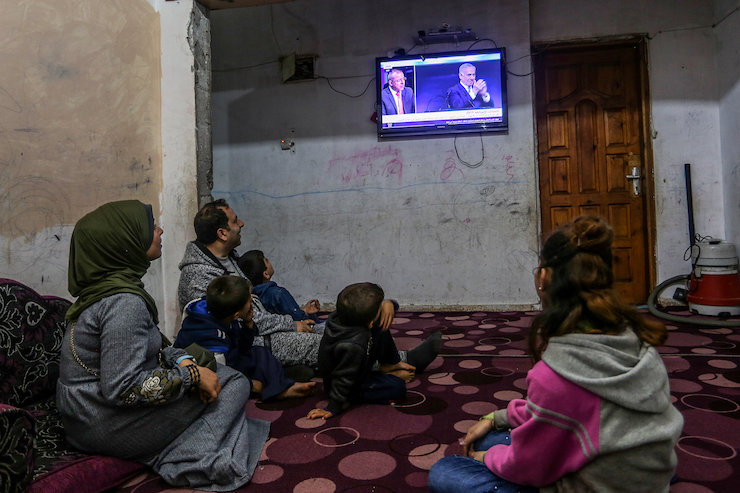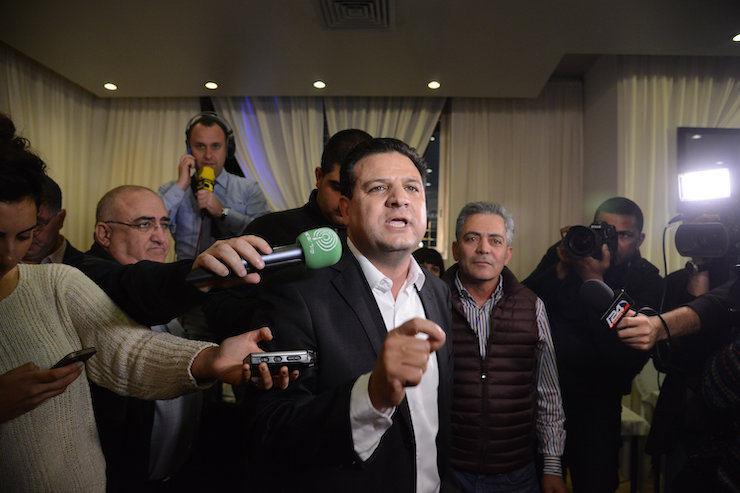Three trends from Israel’s do-over election demonstrate that the more Israeli politics stay the same, the more dangerous its policies become.

There are many moments in Israeli-Palestinian history where landmark developments seem to change nothing and everything at the same time. Israel’s September election is one of them. While featuring many familiar and predictable patterns, the latest political contest has also exposed novel shifts that could significantly alter the conflict’s dynamics. Three key and interconnected trends that reflect this paradox can be drawn from the election, all of which present crucial strategic questions for the Palestinian struggle in the years ahead.
The first trend is the intensified targeting of the voting rights of Palestinian citizens of Israel. A fifth of the state’s population, Palestinian citizens have always faced obstructions to their political activities despite their enfranchisement since 1948. However, under the three consecutive governments of Prime Minister Benjamin Netanyahu, the past decade has seen a startling escalation of racist incitement and measures aimed at further undermining Palestinian participation in the electoral process. This trend is noticeable with each passing election cycle: In the final weeks of the September campaign, Netanyahu launched relentless diatribes about the threat of a “leftist-Arab” government, repeated baseless claims of “voter fraud” in Arab towns, and told his Facebook followers that the Arabs “want to annihilate us all.” His most notorious claim in the 2015 election – warning that Palestinian citizens were heading to the polls “in droves” – seems negligible in comparison.
This intensifying rhetoric has been paired with direct political actions. In April, Likud-affiliated election monitors were found to be carrying over 1,200 hidden cameras at Arab polling stations, with the intention of causing disruptions that would prevent voters from submitting their ballots, and to scare the Palestinian public from coming to the polls for fear of surveillance. Israel’s Central Elections Committee later forbade this practice, but in response, the Likud initiated emergency legislation to have the cameras installed (the bill failed to pass the Knesset). Ironically, these frantic attempts to deter Palestinian citizens backfired: voter turnout jumped from 49 percent in April to 60 percent in September, and the Joint List (the alliance of four Arab-led political parties in Israel) regained its position as the third largest party with 13 Knesset seats.
Despite this outcome, the government remains intent on keeping Palestinian citizens of Israel in its crosshairs. It has portrayed the community as saboteurs of the right-wing’s rule and as enemies of the Jewish-Zionist consensus, thus suggesting that their right to vote ought to be scrutinized — an idea that Avigdor Liberman, head of the far-right Yisrael Beitenu party, has long championed. This is in addition to other methods of political aggression, such as motions to disqualify Arab parties and individuals from running in the elections; a raised electoral threshold (3.25 percent) that makes it harder for Arab parties to enter the Knesset; a law that allows 90 Knesset members to expel a fellow member on political grounds; and disciplinary measures to punish Arab representatives for criticizing government policies abroad. This hostility will likely continue, if not worsen, under another right-wing government.

The second trend is the coalescence of Israeli political parties around the right-wing’s approach to ‘managing’ the Palestinian question. In a resounding historical turn, the September election has firmly ousted the old ‘liberal Zionist’ guard from mainstream politics and reduced its parties to 11 Knesset seats (Labor-Gesher with 6, the Democratic Union with 5). Liberal Zionists never represented a peaceful or democratic camp for Palestinians: the Labor party oversaw the expulsion campaigns of 1948, designed Israel’s discriminatory institutions and the military occupation, and spurred settlement growth during the Oslo years, among other policies. Their decline has nonetheless paved the way for Revisionist Zionists to usurp and reshape the opposition in its own image, with today’s center-left parties adopting many right-wing positions and effectively abandoning the two-state solution as a priority.
Blue and White (Kahol Lavan), led by former army chief Benny Gantz and former television journalist Yair Lapid, is a replica of its rival Likud in nearly all but name. After Netanyahu pledged to annex the Jordan Valley if he was re-elected, the nascent party replied that the plan was their idea all along. After Ayman Odeh, head of the Joint List, made the controversial move of recommending Gantz to replace Netanyahu as prime minister, Gantz remained uninterested in cooperating with the Arab parties. Blue and White is not yet a sustainable political unit: it is a fragile alliance led by four Ashkenazi men, most of them ex-military officials, who are primarily bonded by their loathing of Netanyahu. Still, with 33 seats compared to Netanyahu’s 32, the party has shown that the most effective way to challenge the Likud is to mirror the Likud, offering political continuity but without the prime minister’s personal drama.
The Revisionists’ dominance of the political landscape has been clear for decades; but after this election, the Israeli debate over what to do with the Palestinian ‘problem’ now belongs almost exclusively to the right. There are many clashes and divisions within the right-wing bloc over how to proceed, including whether to create a shriveled Palestinian quasi-state, entrench localized bantustans, or even pursue ‘voluntary’ or forced expulsion. But for now, the consensus remains that until the next collective strategy can be agreed upon, the occupation must be preserved as an integral part of the Israeli state. This is a radical shift from last year when the former Zionist Union, led by Isaac Herzog and Tzipi Livni, still insisted on working towards creating a Palestinian state (even though its vision was hardly different from the right’s). If annexing the Jordan Valley was a debatable idea before, it is now a certain move today.

The third trend is the legal consolidation of a single regime governing all historic Palestine. Regardless of which party wins, or whether a third election is called, the next Israeli government will oversee what is now a fully-enshrined system of racial supremacy stretching from the river to the sea. This ‘one-state reality’ has existed for over 50 years, but the legal dimension has taken on a new nature with the passing of the Jewish Nation-State Law in July 2018. In many ways, the law is nothing new: The infrastructure for Jewish supremacy has long been in place not just through the military laws that oppress Palestinians under occupation, but through over 60 civil laws that discriminate against Palestinian citizens of Israel while upholding Jewish privileges on both sides of the Green Line.
At the same time, the Nation-State Law does change everything by virtue of its constitutional status. It is not merely a declaration: it decrees that Jewish supremacy is no longer a political choice to be made, but a legal obligation to fulfill. This includes viewing the “land of Israel” as the historical homeland of the Jewish people; asserting that the right to self-determination in the state is exclusive to Jews; allowing Arabic to be relegated from its status as an official language; and encouraging Jewish settlement as a “national value.” The Israeli Supreme Court is currently reviewing 14 petitions against the law, including one filed by the legal center Adalah, the Joint List, and the High Follow-Up Committee for Arab Citizens (the first hearing on the case has been postponed due to this year’s repeated elections).
No matter how the legal process unfolds, the “spirit” of the Nation-State Law is quickly becoming an irreversible fact of life. It was cited by Netanyahu as evidence that Israel is not a “state for all its citizens,” but a state for “Jews alone.” It is debated among parties only as a matter of amending it with lip-service to “equality,” without questioning whether the law should exist at all. It is manifested in the city of Afula, where the mayor and municipal council pledged to preserve the city’s “Jewish character.” And it is witnessed in the growing support for securing “Jewish sovereignty” across the West Bank, boosted by the U.S.’s recognition of Jerusalem as Israel’s capital. It would therefore be foolish for international actors to continue believing that Israel is committed to its so-called ‘democratic nature’: The Nation-State Law makes it unequivocal that apartheid is the official law of the land.
The three trends above are well-known to Palestinians. What is lacking, however, is a collective strategy to address them – whether to mitigate the harms they are inflicting on the ground, or to counter them with a holistic political vision. The only actor to offer a practical response is the Joint List, which made the polarizing decision to endorse Gantz with conditions for helping his coalition. For many Palestinians, the List made a grave mistake by abetting the narrative of Blue and White as a democratic savior. They would propose instead to look to other actions outside the Knesset. Others argue that it is vital to remove Netanyahu as the linchpin of Israel’s far-right descent, which is causing irreparable damage to Palestinians. The List is not naïve about Gantz but sees him as a means to disrupt the ‘status quo’ of the past decade. But this, too, is not enough. Without a unified approach to tackle the worsening trends, Palestinians will remain trapped in the paradox of having ‘nothing and everything’ changing for a long time.
This article first appeared on Palestine Square, the blog of the Institute for Palestine Studies USA.

